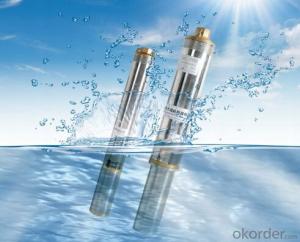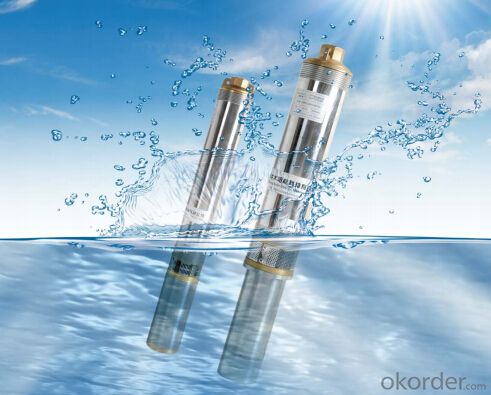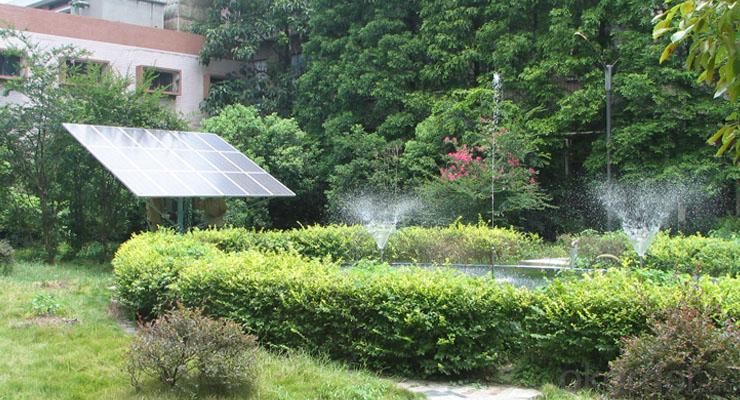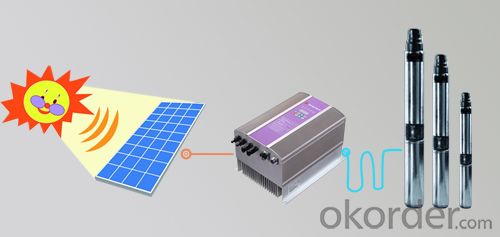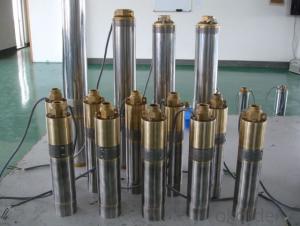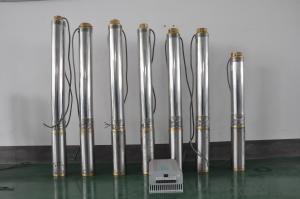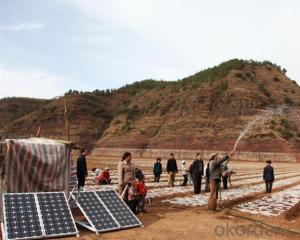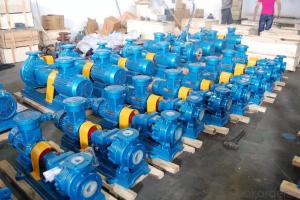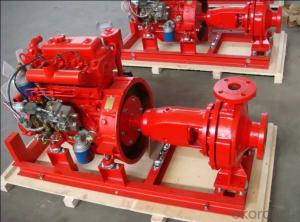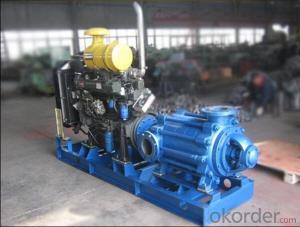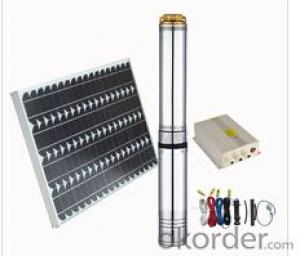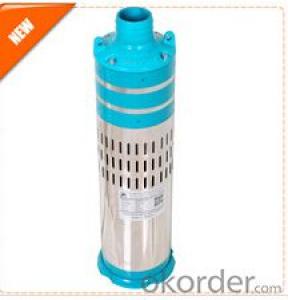Outdoor Solar Water Pump - Centrifugal Pump System 0.65kW for Agricultural Irrigation
- Loading Port:
- Shanghai
- Payment Terms:
- TT OR LC
- Min Order Qty:
- 10 pc
- Supply Capability:
- 1000 pc/month
OKorder Service Pledge
OKorder Financial Service
You Might Also Like
Solar Water Pump Centrifugal Pump System 0.65KW for Agricultural Irrigation
The photovoltaic pumping system is different from the traditional AC pumping system , and the photovoltaic pumping system utilizes solar cells convert solar energy into electric energy , then the photovoltaic pumping inverter drives ac motor for the pump running , and pumping up water from water well , river , lake etc areas and then transport to the destination to satisfy our requests for the water demand .
Photovoltaic arrays adopts solar radiation energy to convert it to electric power ,providing the motive power for the whole system . And the function of the solar pumping inverter is converting the DC power output from PV array to AC power to drive the pump to finalize the water pumping up as well as adjusting the output power real-timely according to the change of sunlight intensity , in this way , the system realizes the max power point tracking and the solar energy can be utilized furthest
The whole system solves the water pumping up requests perfectly , omitting the battery bank and charge controller etc equipments , so it is very economical and environmental . Since they are with the merits of low carbon , energy conversation , environmental protection etc , so they have a broad market foreground and great social value
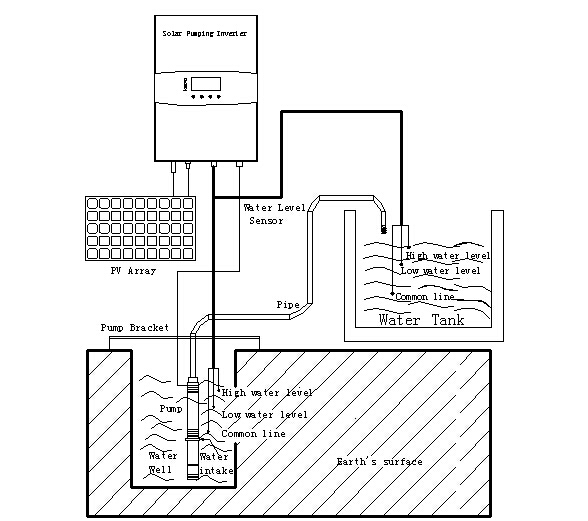
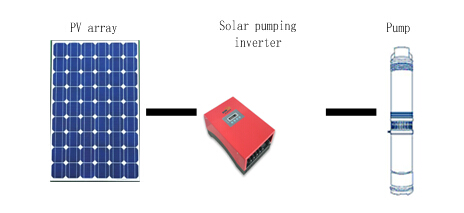
2.2 Application
Agricultural irrigation
Desert manage
Domestic water
Grassland animal husbandry
city waterscape
Island water supply
Landscape and fountain system of municipal engineering , city square , hotels and residence community
2.3 About product
This product is using a high performance digital signal processing chip, can provide solution for solar water pumpingsystem with high cost performance. Solar pumping system as a whole block diagram as shown in 2.
SHP series inverter has the following features:
a. True max power tracking technology (TMPPT) with our own intellectual property; effectively improve the use ratio of PV array. The stable tracking efficiency can reach 99.2% , Solving the problem of bad tracking efficiency and running unstability under the situation of sunlight intensity quick change when comparing with the traditional MPPT method .
b. Adopt efficient IPM power module from Mitsubishi Company with high reliability.
c. With the function of high and low water level detection , high safety factor.
d. Automatic anti-drying protection function , with multi-protection for motor
e. Multi-language LCD display , easy for operation , very user-friendly
f. The independent developed principal computer with our own intellectual properties , remote monitoring is available
g. Modular design , direct plug-in terminal , good-looking appearance, easy for installation , operation and maintenance .
h. Suitable for the pump adopted three phase asynchronous motor
i. Complete digital control , with the function of full automatic running and data storage .
j. Perfect protection system , with the protection function for lighting , over voltage , under voltage , short circuit , over loads , water drain off , low sunlight , over heating etc ,
k. Adopt the complete radiating system , so radiating efficiency is better and the service life is longer
l. Through strict environmental test , adapt the rigorous environment :-10℃~+50℃
m.No impacted mains supply power switch function (optional ), All-weather running available
n. Through strict environmental test , adapt the rigorous environment :-10℃~+50℃
FAQ
1. How fast will my system respond to a power outage?
Our solar inverters typically transfer to battery power in less than 16 milliseconds (less than 1/50th of a second).
2. What kind of batteries do the systems include?
Our solar backup electric systems use special high-quality electric storage batteries.
3. How do I install my system?
A solar backup inverter is connected to a home electric system , we will supply detailed installation manual and videos for our customers .
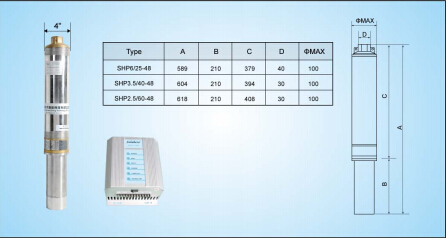
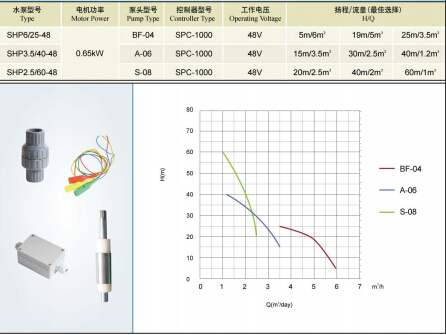
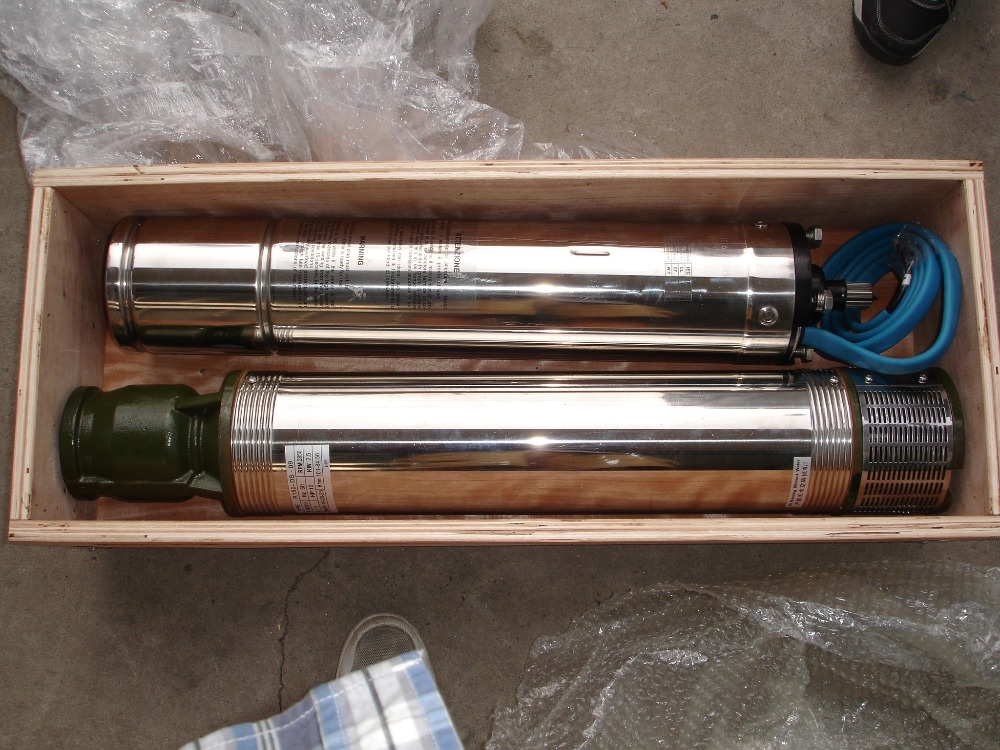
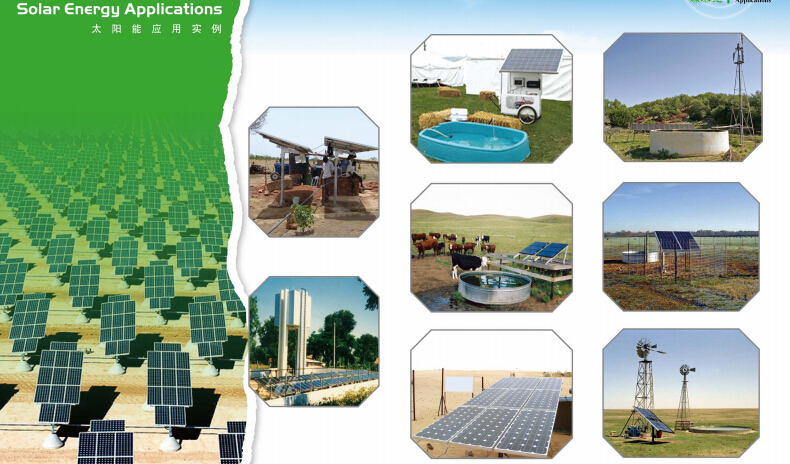




- Q: Can a solar pump be used for emergency water supply during power outages?
- Yes, a solar pump can be used for emergency water supply during power outages. Solar pumps are powered by sunlight, so they do not rely on electrical power from the grid. This makes them a reliable and sustainable option for providing water during emergencies when traditional power sources are unavailable.
- Q: How does the installation of a solar pump affect property value?
- Property value can be positively impacted by the installation of a solar pump. A solar pump offers a cost-effective and environmentally friendly alternative to traditional water pumps that rely on electricity or fuel. By utilizing solar energy, it reduces energy expenses and provides a sustainable power source for water pumping. Homeowners and property buyers who prioritize reducing their carbon footprint and saving money on utility bills are increasingly embracing solar technology. Consequently, properties equipped with solar pumps are often viewed as more attractive and can attract potential buyers who value sustainability and energy efficiency. Furthermore, the installation of a solar pump can enhance the overall value of a property by enhancing its self-sufficiency and resilience. In areas where access to electricity is unreliable or costly, a solar pump guarantees a dependable water supply regardless of power outages or fluctuating energy prices. In addition, the installation of a solar pump can indirectly benefit property value. For example, a property with a solar pump is likely to have a well-maintained water system, crucial for agricultural properties or those in rural areas. This can increase the property's appeal to potential buyers who rely on a consistent water supply for farming, gardening, or other water-dependent activities. However, it is important to consider that the impact on property value may vary based on factors such as location, market trends, and the overall attractiveness of the property. Property owners should also weigh the initial cost of installing a solar pump against the potential increase in property value. In conclusion, the installation of a solar pump can have a positive effect on property value by promoting sustainability, energy efficiency, and resilience. It can attract environmentally conscious buyers and increase the property's desirability for those dependent on a reliable water supply. Nevertheless, the impact on property value should be considered in relation to local market conditions, and the costs and benefits should be carefully evaluated before making a decision.
- Q: Can a solar pump be used for wastewater management?
- Yes, a solar pump can be used for wastewater management. Solar pumps are capable of pumping and treating wastewater efficiently and sustainably by using solar energy as a power source. This technology helps in reducing reliance on traditional electricity sources and mitigates environmental impact while effectively managing wastewater.
- Q: Are solar pumps suitable for use in mountainous regions with varying elevation?
- Yes, solar pumps are suitable for use in mountainous regions with varying elevation. Solar pumps are versatile and can be installed in different terrains, including mountainous areas. They are powered by solar energy, making them independent of electricity grids, which is particularly advantageous in remote regions. Additionally, solar pumps can adjust their pumping capacity based on the available sunlight, making them adaptable to the varying elevation and sunlight conditions of mountainous regions.
- Q: Can a solar pump be used for water features in a garden?
- Yes, a solar pump can be used for water features in a garden. Solar pumps are designed to harness energy from the sun and convert it into power to operate the pump. They are a sustainable and eco-friendly option for creating water features like fountains, waterfalls, or ponds in a garden, as they do not require electricity from the grid. The solar pump can circulate and aerate the water, creating a visually appealing and soothing element in the garden without adding to electricity consumption or costs.
- Q: How does a solar pump handle water with high levels of ammonia or other pollutants?
- A solar pump is typically not designed to handle water with high levels of ammonia or other pollutants. These pumps are primarily used for clean water applications and may not be equipped with the necessary filtration or treatment systems to handle contaminated water effectively. In such cases, alternative water treatment solutions or pump systems specifically designed for polluted water would be more suitable.
- Q: Can a solar pump be used for pool circulation?
- Yes, a solar pump can be used for pool circulation. Solar pumps are designed to efficiently circulate and filter water using energy from the sun. They can be a cost-effective and environmentally friendly option for maintaining pool circulation and ensuring proper water filtration.
- Q: How do I properly size the storage tank for a solar pump system?
- Determining the appropriate size for your storage tank in a solar pump system involves taking various factors into consideration. These factors include the flow rate of the pump, the amount of water needed, and the energy production of the solar panel. Below are the steps you can follow to find the right size for your storage tank: 1. Calculate your water requirements: Begin by determining the amount of water you need for your daily usage or the specific purpose for which you intend to use the solar pump system. This could be for purposes such as irrigation, livestock, or domestic use. Take into account factors such as the number of people or animals, their water consumption, and any additional water needs. 2. Assess the daily solar energy supply: Evaluate the potential energy production of the solar panels by considering the average number of sunlight hours in your area, the efficiency of the panels, and the capacity of the system. This assessment will help you estimate the daily amount of energy available to power the pump. 3. Calculate the required storage capacity: To determine the size of the storage tank, you need to consider both the daily water requirement and the solar energy supply. Divide the daily water requirement by the available solar energy to calculate the minimum storage capacity required. For example, if you need 1000 liters of water per day and your solar pump system can produce 500 liters using the available energy, you would need a storage capacity of at least 2 days (1000 liters / 500 liters = 2 days). 4. Take into account weather and demand variations: Depending on your location and the weather conditions, the availability of solar energy may vary. Additionally, water demand may fluctuate from day to day. To ensure a reliable water supply, it is advisable to incorporate some buffer capacity in your storage tank. This buffer capacity can account for days with less sunlight or increased water demand, ensuring a consistent water supply even during unfavorable conditions. 5. Seek professional advice: If you are uncertain about the calculations or need assistance in determining the optimal storage tank size, consider consulting with professionals or engineers who specialize in solar pump systems. They can provide expert advice and help you select the most suitable storage tank size based on your specific requirements. By following these steps and considering the necessary factors, you can determine the appropriate size for your storage tank in a solar pump system. This will ensure an efficient and dependable water supply.
- Q: Are there any limitations on the water hardness or softness that a solar pump can handle?
- Yes, there are limitations on the water hardness or softness that a solar pump can handle. The main concern is with hard water, which contains high levels of minerals such as calcium and magnesium. These minerals can cause scaling and buildup on the pump components, reducing its efficiency and lifespan. Soft water, on the other hand, usually doesn't pose any significant limitations for solar pumps. However, it's important to note that each solar pump model may have specific recommendations and guidelines provided by the manufacturer regarding water hardness, so it's best to consult the pump's specifications for more accurate information.
- Q: Can a solar pump be used in areas with limited technical expertise?
- Yes, a solar pump can be used in areas with limited technical expertise. Solar pumps are designed to be simple and user-friendly, requiring minimal technical knowledge for installation and operation. They often come with easy-to-follow instructions and require basic maintenance. Additionally, solar pumps are typically more reliable and have fewer moving parts compared to traditional pumps, reducing the need for frequent repairs and servicing. Hence, even in areas with limited technical expertise, solar pumps can provide a sustainable and accessible solution for water pumping needs.
Send your message to us
Outdoor Solar Water Pump - Centrifugal Pump System 0.65kW for Agricultural Irrigation
- Loading Port:
- Shanghai
- Payment Terms:
- TT OR LC
- Min Order Qty:
- 10 pc
- Supply Capability:
- 1000 pc/month
OKorder Service Pledge
OKorder Financial Service
Similar products
Hot products
Hot Searches
Related keywords
